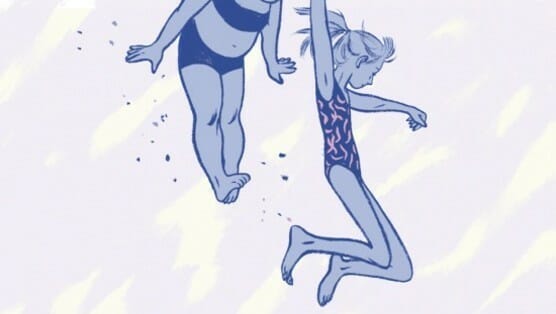
Writer: Mariko Tamaki
Artist: Jillian Tamaki
Publisher: First Second
Release Date: May 14, 2014
To pigeonhole This One Summer as a young adult graphic novel would be a real shame. Yes, the narrative may be perfectly suited to that age group, but the label would motivate many readers to write off the book without giving it the time it deserves. Creators (and cousins) Jillian and Mariko Tamaki have fashioned a subtle, beautiful, intelligent read that happens to have two female teenagers as its main characters. The story deals with issues that are particularly important to that time in one’s life, such as how much the attention of males matters to one’s fluid self-definition.
This description may make This One Summer sound like an “important” book — 320 pages of after-school special slog. But its delivery is impressively understated and focused on sensory experiences. The limited time and place in which it takes place (a single summer at a lake house) let the action unfold slowly, constructing characters out of moments witnessed rather than narrated. Mariko Tamaki’s art and page construction (especially her unexpected close-up panel framing) reinforces Jillian’s storytelling, layering a narrative out of ephemera. This metaphor is only reinforced by the book’s (SPOILER ALERT) closing image: a literal heap of beach glass, shells, stones and other detritus Rose has collected over the summer. A slight manga influence — wide, blank eyes in some characters, some night-set brushwork — bleeds through the line work, but this aesthetic stands out with more detail, more lyricism and a wider variety of body types than one finds in most YA manga.
Jillian’s approach to dialogue is as deft as Mariko’s illustrations, and the scattering of words like “boobs” throughout the pages punctures any self-seriousness that might dilute the story into a soap opera. Parallel narratives follow the area’s older teenagers and the drama between Rose’s parents, but they don’t feel subsidiary so much as new threads pieced together by our primary characters. It’s like an older version of Harriet the Spy, where the egotism of youth gives way to an awareness to perceive the world beyond oneself. Most of all, the book pulls off the clever trick of rendering nostalgia without romanticism, capturing the feel of summer when it actually meant something.
![]()


